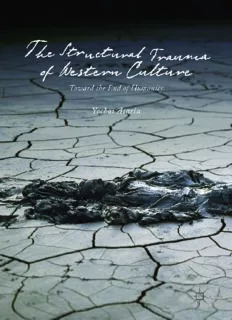Table Of ContentThe Structural Trauma of Western
Culture
YochaiAtaria
The Structural
Trauma of Western
Culture
Toward the End of Humanity
YochaiAtaria
Tel-HaiAcademicCollege
andOpenUniversityofIsrael
UpperGalilee,Northern,Israel
TranslatedbyDonnaBossin
ISBN978-3-319-53227-1 ISBN978-3-319-53228-8(eBook)
DOI10.1007/978-3-319-53228-8
LibraryofCongressControlNumber:2017935478
©TheEditor(s)(ifapplicable)andTheAuthor(s)2017
This work is subject to copyright. All rights are solely and exclusively licensed by the
Publisher,whetherthewholeorpartofthematerialisconcerned,specificallytherightsof
translation, reprinting, reuse of illustrations, recitation, broadcasting, reproduction on
microfilms or in any other physical way, and transmission or information storage and
retrieval,electronicadaptation,computersoftware,orbysimilarordissimilarmethodology
nowknownorhereafterdeveloped.
Theuseofgeneraldescriptivenames,registerednames,trademarks,servicemarks,etc.inthis
publicationdoesnotimply,evenintheabsenceofaspecificstatement,thatsuchnamesare
exemptfromtherelevantprotectivelawsandregulationsandthereforefreeforgeneraluse.
Thepublisher,theauthorsandtheeditorsaresafetoassumethattheadviceandinformation
in this book are believed to be true and accurate at the date of publication. Neither the
publishernortheauthorsortheeditorsgiveawarranty,expressorimplied,withrespectto
thematerialcontainedhereinorforanyerrorsoromissionsthatmayhavebeenmade.The
publisherremainsneutralwithregardtojurisdictionalclaimsinpublishedmapsandinstitutional
affiliations.
Coverimage:“Wild”©YiftachBelsky
Printedonacid-freepaper
ThisPalgraveMacmillanimprintispublishedbySpringerNature
TheregisteredcompanyisSpringerInternationalPublishingAG
Theregisteredcompanyaddressis:Gewerbestrasse11,6330Cham,Switzerland
Thisbook isdedicated with love,admiration, andaweto my
grandfather and myfather
A
CKNOWLEDGMENTS
First, I want to thank Yemima Ben-Menachem. We have been working
together for more than half a decade, and during this time Yemima has
always allowed me to develop in directions that interested me and has
supported me unconditionally. She is one of a kind, the type of advisor
every student dreams of. It is an honor and a pleasure to be in her
presence. I also extend my thanks to Yuval Neria, who has been advising
me since I completed my master’s degree and who is always there to
provide help, support, and encouragement. Yuval is clearly a role model
forme.
ThankstoProf.HavivaPedaya,whomademebelievethatmyideasare
interesting and worthwhile and that I have something new to say. I also
wanttothankAmosGoldbergforhisvaluablesuggestionsandforprovid-
ing answers to all my questions. Thank you to Mooli Lahad, a rare
individual on the Israeli scene, a friend and partner and the object of my
boundlessadmirationandlove.IalsowouldliketothankDennisSobolev,
Koji Yamashiro, Michael Keren, David Gurevitz, and Ory Bartal for sup-
portingme throughoutthisjourney.
Amos Arieli, my advisor during my postdoctoral studies at the
Weizmann Institute, is an outstanding individual and my guiding star,
and I am grateful for every moment I spent in his presence. My heartfelt
thanks goto HaimNagid,editor atSafraPublishers, whowasthefirstto
believe in meandinmy book.
I wrote the first version of one of the chapters in this book during my
undergraduatestudiesattheUniversityofHaifa.Iwouldalsoliketothank
the Ofakim Honors Program at the University of Haifa for their support
vii
viii ACKNOWLEDGMENTS
andforgivingmetheopportunitytobemyownperson.Iamgratefulto
YossiZiegler,whoacceptedmeontotheprogramandwasalwaysthereto
put in a good word. I again want to acknowledge Dennis Sobolev’s
important contribution to my personal development. He exposed me to
the world ofKafka,forwhich I willbe eternally grateful.
I wrote most of the chapters of this book while I was studying for my
doctorateattheHebrewUniversity.Duringthatperiod,Ireceivedfinan-
cialsupportfromanumberoffoundations,andIextendmythankstothe
university and to the Rotenstreich scholarship. Two additional chapters
were written during my postdoctoral studies at the Weizmann Institute,
and I am grateful to that institution for its support. I completed the final
editing of the book after being hired to work at Tel-Hai College, and I
want to thank the college for providing financial support for the final
editing.
Thank you to Donna Bossin for translating the book into English and
toGadiBossinforeditingandpolishingthetranslation.Ittookmealong
time to find a translator I could depend upon, and Donna did not
disappointme.Shealwayswasabletofindtherightwordandtheproper
phrasetoexpressmyideasclearlyandcoherently. Withouther,thisbook
could nothave been published.
Finally, I extend my heartfelt thanks to Rachel Krause Daniel, Senior
Commissioning Editor for Scholarly and Reference Books at Palgrave
Macmillan,forbelievinginmeandinmywork.Hersupportwasofcrucial
importanceingettingthebookpublished.IwouldlikealsotothankKyra
Saniewski.
Lastbutnotleast,abigthankyougoestoDavidShimonovich,whodid
theinitialeditingofallthearticlesinthebook.Davidhasbeengivingme
hisloyal,patient,andprecisesupportformorethanadecade,andIthank
him fromthe bottomof myheart.
C
ONTENTS
1 The Sources of WesternTrauma: From theAkeda
of IsaactoKafka 1
2 Toward Post-Humanity:A Literary
Consideration 21
3 A Serious Man 45
4 The Crisis of Manhood 63
5 The New Godof Anarchy 73
6 The Body in the PostmodernEra:A View
fromCaptivity 85
7 K.’sFatalistic World 99
8 This isthe End: AWorld of Silence 119
9 Techno Rather thanGuns 139
10 Culture-Trauma: Some CriticalRemarks 163
ix
x CONTENTS
Bibliography 183
Index 193
A A
BOUT THE UTHOR
Yochai Ataria completed his doctorate at the Hebrew University of
Jerusalem and his post doctorate at the weizmann institute of science.
AtariaiscurrentlyaseniorlectureratTel-HaiCollegeandaresearcherat
the Open University of Israel. He has published over 30 theoretical,
empirical, and philosophical papers. Together with others, Ataria has
also edited the following books: Kafka: New Perspectives (Safra, 2013),
theInterdisciplinaryHandbookofTraumaandCulture(Springer,2016),
andThe Post-HumanisticAge (Pardes, 2016).
xi
Description:This book describes the diverse manifestations of trauma and the ways in which trauma has shaped—and dismantled—our culture. Yochai Ataria describes how we are addicted to trauma and have become both its avid producers and consumers. Consequently, the culture in which we live has become posttrau

